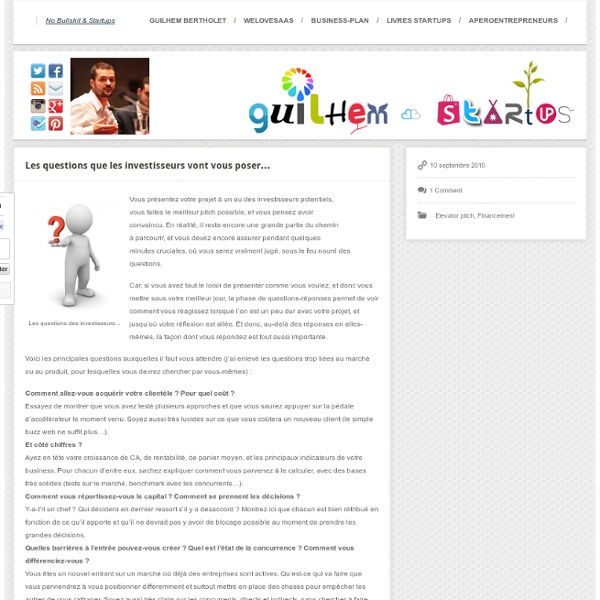Les questions que les investisseurs vont vous poser…
Par Guilhem Bertholet Vous présentez votre projet à un ou des investisseurs potentiels, vous faites le meilleur pitch possible, et vous pensez avoir convaincu. En réalité, il reste encore une grande partie du chemin à parcourir, et vous devez encore assurer pendant quelques minutes cruciales, où vous serez vraiment jugé, sous le feu nourri des questions. Car, si vous avez tout le loisir de présenter comme vous voulez, et donc vous mettre sous votre meilleur jour, la phase de questions-réponses permet de voir comment vous réagissez lorsque l’on est un peu dur avec votre projet, et jusqu’où votre réflexion est allée. Voici les principales questions auxquelles il faut vous attendre (j’ai enlevé les questions trop liées au marché ou au produit, pour lesquelles vous devrez chercher par vous-mêmes) : Comment allez-vous acquérir votre clientèle ?
Startup financing cycle.svg - Wikipedia, the free encyclopedia
Cancel Edit Delete Preview revert Text of the note (may include Wiki markup) Could not save your note (edit conflict or other problem). Please copy the text in the edit box below and insert it manually by editing this page. Upon submitting the note will be published multi-licensed under the terms of the CC-BY-SA-3.0 license and of the GFDL, versions 1.2, 1.3, or any later version. Add a note Draw a rectangle onto the image above (press the left mouse button, then drag and release). Save To modify annotations, your browser needs to have the XMLHttpRequest object. [[MediaWiki talk:Gadget-ImageAnnotator.js|Adding image note]]$1 [[MediaWiki talk:Gadget-ImageAnnotator.js|Changing image note]]$1 [[MediaWiki talk:Gadget-ImageAnnotator.js|Removing image note]]$1
Raising The Most Money Doesn’t Mean Your Company Will Become The Most Valuable
Editor’s note: Guest writer Jules Maltz is a General Partner at Institutional Venture Partners (IVP), a late-stage venture capital firm based in Menlo Park. You can follow him on Twitter @julesmaltz. One of my favorite recent blog posts is Seth Godin’s “Getting funded is not the same as succeeding.” Whether or not we’re in a bubble, it’s a sign of the times that this post has to be written in the first place. As Josh Elman tweets, we’ve gone from RIP Good Times to funding a grilled cheese company in less than three years (Sequoia was involved in both interestingly). Instead of focusing on the companies that are creating the most value for their customers, we’re talking about who raised the largest round or who’s part of the billion dollar valuation club. And this is dangerous. While many of these companies have had good outcomes (IVP invested in HomeAway, Cortina, and Vonage), it’s surprising how few lasting, quality multi-billion dollar companies are on this list.
Meeting With An Investor? Read This First
Why Startups Should Raise Money at the Top End of Normal
Editor’s Note: This is a guest post by Mark Suster (@msuster), a 2x entrepreneur, now VC at GRP Partners. Read more about Suster at his Startup Blog, BothSidesoftheTable. I have conversations with entrepreneurs and other VCs on a daily basis about fund raising, the prices of deals, how much companies should raise, etc. I’ve stopped talking about this as much publicly because it’s such a heated, emotional topic where the points-of-view are strictly subjective and for which the answers will only be revealed in the future. I’ve decided to take all of my private points-of-view on the topic and make them public in a keynote speech at the Founder Showcase in San Francisco on June 15th. I thought I’d post on one of the topics beforehand. Huh? Here’s what I mean. Every day shareholders vote on the value of the company by buying or selling shares. Private markets for stocks are the opposite. There is no great science to it. There is no such thing as a uniform price. Here’s the problem.
How Much Money To Raise
Image via Wikipedia I spent some time yesterday talking to an entrepreneur about this topic and I thought I'd share what I told him with everyone. When your company is growing really fast, doubling employees year over year, adding users and customers at a very rapid rate, you don't want to raise too much money. If you raise three or four years of cash, there is a very good chance that by your second year, you will be sitting on cash that you raised when your company was worth considerably less. That's not a good thing. It's too dilutive to you and your co-founders and angels. I've got two basic rules of thumb. Second, raise 12-18 months of cash each time you raise money. These rules are most applicable in the early stages. But for the seed, Series A, and Series B rounds, I think 10-20% dilution and 12-18 months of cash are ideal.
Collaborative Fund
Related:
Related:



